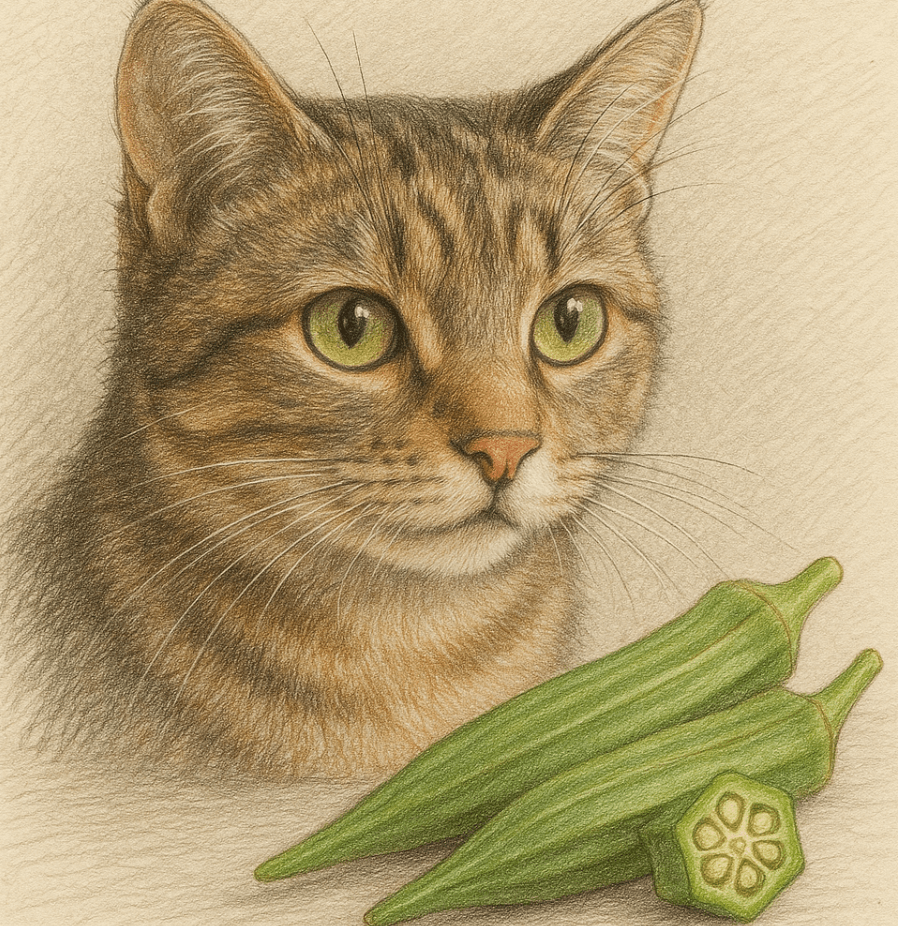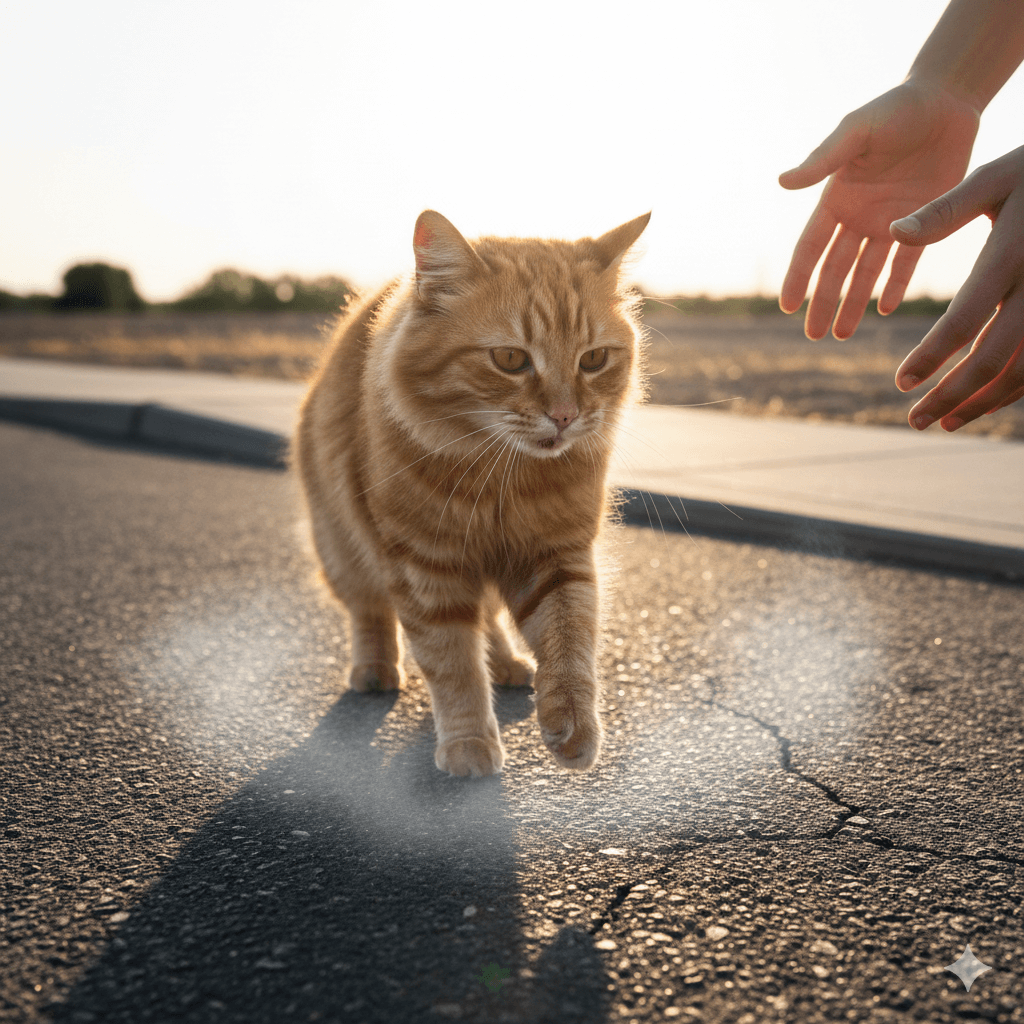Can Cats Eat Okra?
As a cat owner, you may have wondered whether certain human foods are safe for your feline friend. One such food is okra, a nutrient-rich vegetable often enjoyed in soups, stews, and side dishes. While cats are obligate carnivores and thrive on a meat-based diet, occasional curiosity about plant-based foods like okra is natural. But can cats eat okra safely? In this blog post, we’ll explore the potential benefits, risks, and considerations of feeding okra to your cat. Whether you’re looking to diversify their diet or simply curious about their dietary needs, this guide will provide all the information you need to make an informed decision.
Potential Benefits of Okra for Cats
While cats primarily rely on animal protein for nutrition, small amounts of certain vegetables, like okra, can offer some health benefits when fed in moderation. Here’s what okra might contribute to your cat’s diet.
Rich in Fiber:
Okra contains dietary fiber, which can support healthy digestion and prevent constipation in cats prone to digestive issues.Low in Calories:
As a low-calorie vegetable, okra can be a safe treat option for cats without adding unnecessary weight.Packed with Vitamins:
Okra is rich in vitamins like vitamin C, vitamin K, and folate, which can support immune function and overall health.Hydration Support:
With its high water content, okra can help keep your cat hydrated, especially if they don’t drink enough water.Antioxidant Properties:
The antioxidants in okra may help reduce inflammation and support long-term health in cats.
While these benefits exist, it’s important to remember that okra should only be an occasional addition to your cat’s diet, not a staple.
Risks of Feeding Okra to Cats
Despite its nutritional value, okra isn’t without risks when fed to cats. Understanding these potential dangers ensures you make the best choices for your pet’s well-being.
Digestive Upset:
Some cats may experience gas, bloating, or diarrhea after consuming okra due to its fibrous nature.Choking Hazard:
Raw or improperly prepared okra pieces can pose a choking risk, especially for smaller cats.Allergic Reactions:
Though rare, some cats may develop allergic reactions to new foods like okra, resulting in itching or vomiting.Difficulty Digesting Plant Matter:
Cats lack the enzymes needed to fully digest plant-based foods, making okra harder for them to process.Overfeeding Risks:
Feeding too much okra can lead to nutrient imbalances, as cats require a diet primarily composed of animal protein.
These risks highlight the importance of moderation and careful preparation when introducing okra to your cat’s diet.
Check this guide 👉Can Cats Eat Pork Rinds? Best 7 Expert Tips!
Check this guide 👉Can Cats Eat Beef Liver? Best 7 Expert Tips!
Check this guide 👉Can Cats Eat Caviar? Best 7 Expert Tips!

Safe Ways to Feed Okra to Cats | Things to Avoid When Feeding Okra |
|---|---|
Serve cooked, plain okra | Adding spices, salt, or seasoning |
Offer small, bite-sized pieces | Feeding raw or unchewed okra |
Mix with regular cat food | Giving large quantities at once |
Monitor for adverse reactions | Using fried or oily preparations |
Consult your vet before introducing | Overfeeding as a treat |
How to Safely Introduce Okra to Your Cat
If you decide to feed okra to your cat, it’s essential to do so carefully to avoid any negative effects. Follow these tips to ensure a safe and positive experience.
Start with Small Portions:
Begin by offering a tiny piece of cooked okra to gauge your cat’s reaction and tolerance.Cook It Plain:
Avoid adding butter, oil, or seasoning, as these can upset your cat’s stomach or be harmful.Cut into Tiny Pieces:
Chop the okra into small, manageable pieces to prevent choking and aid digestion.Observe for Reactions:
Watch for signs of digestive upset, such as vomiting, diarrhea, or lethargy, after feeding.Limit Frequency:
Treat okra as an occasional snack rather than a regular part of your cat’s diet.
By taking these precautions, you can minimize risks while allowing your cat to enjoy a new flavor.
Signs Your Cat May Not Tolerate Okra
Not all cats will react positively to okra, and some may show signs of intolerance or discomfort. Recognizing these symptoms helps you act quickly to protect your cat’s health.
Vomiting or Nausea:
If your cat vomits shortly after eating okra, it could indicate digestive distress.Diarrhea or Loose Stools:
Changes in stool consistency often signal that the food isn’t agreeing with your cat.Loss of Appetite:
A sudden refusal to eat may suggest that okra has caused stomach upset or discomfort.Excessive Gas or Bloating:
Increased flatulence or a swollen belly can occur if your cat struggles to digest the fiber in okra.Lethargy or Irritability:
Unusual tiredness or crankiness may indicate that your cat isn’t feeling well after eating okra.
If you notice any of these signs, discontinue feeding okra and consult your veterinarian if symptoms persist.
Common Mistakes to Avoid When Feeding Okra to Cats
Feeding okra to your cat requires careful consideration to avoid mistakes that could harm their health. Here are some pitfalls to watch out for.
Adding Seasonings:
Salt, pepper, or spices can irritate your cat’s digestive system and should always be avoided.Feeding Fried Okra:
Fried or greasy preparations are unhealthy for cats and can lead to obesity or pancreatitis.Ignoring Portion Sizes:
Overfeeding okra can disrupt your cat’s balanced diet and cause nutrient imbalances.Assuming All Cats Will Like It:
Some cats may reject okra entirely, and that’s perfectly normal—don’t force them to eat it.Skipping Vet Consultations:
Always check with your vet before introducing new foods, especially if your cat has pre-existing health conditions.
Avoiding these mistakes ensures a safer and healthier experience for your cat.
Alternatives to Okra for Cats
If okra doesn’t suit your cat’s tastes or dietary needs, there are plenty of other safe and nutritious alternatives to try.
Steamed Carrots:
Cooked carrots are easy to digest and packed with vitamins that support eye health.Plain Pumpkin:
Canned pumpkin (not pie filling) can aid digestion and is a favorite among many cats.Green Beans:
Low in calories and high in fiber, green beans make a great occasional treat.Zucchini:
This mild vegetable is easy to prepare and gentle on your cat’s stomach.Blueberries:
Rich in antioxidants, blueberries can be offered in small amounts as a sweet, healthy snack.
These alternatives provide variety while ensuring your cat’s diet remains balanced and safe.
Understanding Your Cat’s Dietary Needs
Cats have unique dietary requirements as obligate carnivores, meaning their bodies are designed to thrive on meat-based diets. Understanding these needs helps you make better decisions about their food.
High Protein Requirements:
Cats need a diet rich in animal protein to support muscle development and overall health.Limited Ability to Process Plants:
Unlike humans, cats lack the enzymes needed to efficiently digest plant matter, making vegetables like okra supplementary at best.Essential Nutrients from Meat:
Taurine, arachidonic acid, and vitamin A are nutrients cats must obtain from animal sources, as they cannot synthesize them.Water Content Matters:
Cats often don’t drink enough water, so moisture-rich foods like wet cat food can help maintain hydration.Avoid Overdoing Treats:
Treats, including vegetables, should make up no more than 10% of your cat’s daily caloric intake.
By prioritizing their carnivorous nature and nutritional needs, you can ensure your cat thrives on a balanced and species-appropriate diet.
Frequently Asked Questions About Cats and Okra
Is okra toxic to cats?
No, okra is not toxic to cats, but it should be fed in moderation due to its fibrous nature.
Can kittens eat okra?
Kittens have sensitive digestive systems, so it’s best to avoid feeding them okra until they’re older.
Should I cook okra before giving it to my cat?
Yes, cooking okra makes it easier to digest and reduces the risk of choking.
How much okra can I feed my cat?
Stick to very small portions—no more than a teaspoon or two—as an occasional treat.
What should I do if my cat eats raw okra?
Monitor them closely for signs of choking or digestive upset, and contact your vet if necessary.
Making Informed Choices About Okra for Your Cat
While okra isn’t a necessary part of your cat’s diet, it can be a safe and occasional treat when prepared and offered correctly. By understanding the potential benefits and risks, as well as following safe feeding practices, you can ensure your cat stays healthy and happy. Always prioritize your cat’s primary nutritional needs, which center around animal protein, and consult your veterinarian before introducing any new foods. With care and attention, you can satisfy your cat’s curiosity about human foods while keeping their well-being top of mind.
Newfoundland Dog Personality: Best 7 Expert Tips! – Discover the gentle, loyal, and protective nature of this giant breed perfect for families.
Can Hot Pavement Burn Your Cats Paws? Best 7 Expert Tips! – Learn how to protect your cat’s paws from hot surfaces and prevent painful burns this summer.
Can Hot Pavement Burn Your Dogs Paws? Best 7 Expert Tips! – Learn how to protect your dog’s paws from hot surfaces and ensure safe summer walks.
Irish Wolfhound Size: Best 7 Expert Tips! – Discover the ideal height, weight, and care tips for this majestic giant breed. Learn how to manage their impressive stature responsibly.




